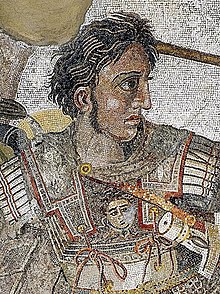The Cynicism of Alexander
By Cale Gressman
“To the strongest.” These were, purportedly, the last words of Alexander the Great as he lay dying from some disease in Babylon. He was only 32 years old, but he had conquered much of the known world in a brilliant military, diplomatic, and cultural campaign that led him from Attica to the Indus. So as he lay dying in Babylon, having sired a son with one of his wives, Alexander, rightly titled, the Great decided that his vast empire ought to go to whoever won it. These of course being his generals.
So what gives? Why would one of history’s greatest conquerors decide to effectively throw all that he had built in such a short time and toss it up to chance? This author thinks it might have been a form of cynicism.
Why do I think this? Well, there were two separate incidents that confirm this to my mind. The first was Alexander’s interaction with Diogenes. Diogenes was a Greek philosopher in the city of Corinth. He is the progenitor of the philosophy of cynicism. Diogenes, you see, thought nothing of wealth, power, or even comfort. He lived on the street. Never bathed. And people generally thought of him as that; the crazy guy living on the street. His life’s purpose, according to him, was to “debase the currency” of the world or rather destroy all customs and norms as they, in his opinion, allowed men to not question their actions but just act as they’ve been told to. Word of this man reached Alexander.
Alexander in his youth had been taught by none other than the philosopher Aristotle. This engendered in the Macedonian king a love of philosophy. He is reported to never have gone anywhere without the works of Homer (whose works the Iliad and the Odyssey can be considered the rough equivalent of the Hellenic Bible). Prior to Alexander and his army’s departure from Greece to invade Persia, Alexander was in Corinth gathering his army. While there, he heard that Diogenes of Sinope, who was by then quite famous, was not planning to meet with the King of Macedon. So Alexander, anxious to meet such an esteemed philosopher, went to Diogenes. Plutarch describes the scene as such,
And now a general assembly of the Greeks was held at the Isthmus,where a vote was passed to make an expedition against Persia with Alexander, and he was proclaimed their leader. Thereupon many statesmen and philosophers came to him with their congratulations, and he expected that Diogenes of Sinope also, who was tarrying in Corinth, would do likewise. But since that philosopher took not the slightest notice of Alexander, and continued to enjoy his leisure in the suburb Craneion, Alexander went in person to see him; and he found him lying in the sun. Diogenes raised himself up a little when he saw so many persons coming towards him, and fixed his eyes upon Alexander. And when that monarch addressed him with greetings, and asked if he wanted anything, "Yes," said Diogenes, "stand a little out of my sun." It is said that Alexander was so struck by this, and admired so much the haughtiness and grandeur of the man who had nothing but scorn for him, that he said to his followers, who were laughing and jesting about the philosopher as they went away, "But verily, if I were not Alexander, I would be Diogenes." (Plutarch, Life of Alexander, 14:1-5)
This story is interesting for the fact that it presents Alexander, by then an already blooded and brilliant commander, as being a fanboy. Other kings would have likely taken Diogenes’ inattention as a slight, but Alexander seems to have taken this no-mind.
However, in the presence of Alexander, Diogenes still pays him no mind. Alexander is unimportant. And in the face of Alexander’s flattery/admiration says effectively, “yeah I like being me too.” Why would Alexander take this?
I’d venture a guess that this was a very famous aesthetic he was talking to. A man who valued virtue over norms. And as such, treated Alexander as effectively a nobody. Perhaps this was endearing to Alexander, who grew up in an environment wherein people treated him as if he was something special. That he was better.
An alternative story of this encounter is that Alexander came upon Diogenes looking at some human bones (I have no clue if the ancient world had just piles of human bones lying around but let’s just go with it). Alexander asks Diogenes why he’s doing this and he responds “I am searching for the bones of your father, but cannot distinguish them from those of a slave.” While a bit more blunt than the former account, this one still places Diogenes and Alexander as equals.
A similar incident occurred after Alexander’s conquests in Persia when he had made his way all the way to the Indus River. It was here that Alexander came across some Indian Sages known as the Gymnosophists (naked philosophers) who were aesthetics that emphasized a renunciation of worldly desires. The Roman historian Arrian tells the tale like this:
I have always liked the story of the Indian sages, some of whom Alexander chanced to come upon out of doors in a meadow, where they used to meet to discuss philosophy. On the appearance of Alexander and his army, these venerable men stamped with their feet and gave no other sign of interest. Alexander asked them through interpreters what they meant by this odd behavior, and they replied:
"King Alexander, every man can possess only so much of the earth' surface as this we are standing on. You are but human like the rest of us, save that you are always busy and up to no good, traveling so many miles from your home, a nuisance to yourself and to others. Ah well! You will soon be dead, and then you will own just as much of this earth as will suffice to bury you."
Alexander expressed his approval of these sage words; but in point of fact his conduct was always the exact opposite of what he then professed to admire. [...]
One must admit, than, that Alexander was not wholly a stranger to the loftier flights of philosophy; but the fact remains that he was, to an extraordinary degree, the slave of ambition.
In Taxila, once, he met some members of the Indian sect of Wise Men whose practice it is to go naked, and he so much admired their powers of endurance that the fancy took him to have one of them in his personal train. The oldest man among them, whose name was Dandamis (the others were his pupils), refused either to join Alexander himself or to permit any of his pupils to do so.
"If you, my lord," he is said to have replied, "are the son of god, why - so am I. I want nothing from you, for what I have suffices. I perceive, moreover, that the men you lead get no good from their world-wide wandering over land and sea, and that of their many travels there will be no end. I desire nothing that you can give me; I fear no exclusion from any blessings which may perhaps be yours. (The Anabasis of Alexander by Arrain of Nicomedia, 7.1.5-2.3)
Here Alexander's respect for the “cynic” philosophy. Or rather his respect for aesthetics. Here is a group of naked Indian dudes declaring that he, a conqueror, is no better than them, a bunch of naked hippies. Alexander isn’t offended by this. In fact, the sources seem to indicate that he might perhaps join these aesthetics if not for his overwhelming ambition.
This brings us back to the quotation at the beginning of the piece. “To the strongest” makes sense. Alexander, a military genius, had carved out one the world’s largest empires. But perhaps to Alexander’s mind, this was worth noting in the end. The Good Book warns us to not “gain the world but lose our souls.” Many at the end of things, realize that it was not worth it in the end. Maybe this was Alexander. Maybe he ultimately could not see the point to his wars. Maybe he thought it just didn’t matter.
P.S: the quotation “to the strongest” is attributed to Alexander by Plutarch. The historians Arrian, Quintus Curtius, and Diodorus also wrote about Alexander. No primary or contemporary sources survive that give us exactly what Alexander said, what we have is based on the sources that the historians mentioned above used for their works. Notably, each of them says that Alexander said a different thing prior to death. So for full transparency, I am in a sense cherry-picking. But I assure you the rest of the cherries are still in the tree.


Comments
Post a Comment